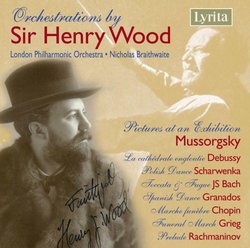Missing "Pictures" found at last!
Classical Curiosities | Canton, OH, USA | 12/26/2007
(4 out of 5 stars)
"My obsession of collecting the many various "versions" of Mussorgsky's "Pictures at an Exhibition" is at last satisfied with the release of this orchestration by Sir Henry Wood. In the bargain, there are several other orchestrations by this master, which should substantially stimulate the curiosity of music lovers. Wood's orchestration appeared some time before Ravel's and was performed by Wood on a number of occasions, but for some odd reason (inferiority complex?) he withdrew it with the appearance of the Ravel version. How does it compare? Actually, it is similar in many respects, and it is surprising to what extent Wood anticipates Ravel. So what's different? First of all, the Promenade theme is presented only once at the beginning. All the other selections are included. The big surprise comes toward the end: the big buildup to "the Great Gate at Kiev" is missing, replaced by the ominous sounds of deep-throated "mushroom bells" followed by the sudden explosive "Great Gate" theme. Wood loves his percussion, and makes dramatic use of it here and in all of the other selections as well. Take, for example, his version of Debussy's "Engulfed Cathedral," with clanging bells and other devices which exceed anything Debussy might have done. Chopin's "Funeral March" is bone-crushing and very heavy-handed orchestrally, but wow, does it ever take your breath away! (Is there a latent joke of some sort hidden here?) But for another surprise, the album opens with Wood's version of Bach's Toccata and Fugue in D Minor, which far outstrips Stokowski in its use of . . . percussion. Only one other orchestration matches this one, and that is the one by Scrowachevski (Sp?), released on Chandos ("Bach Orchestrations" by famous conductors; Slatkin and the BBC). This too is a "must have," for folks like me who enjoy this sort of thing.
MJA
"
WOW!
Kimba W. Lion | the East Coast | 10/30/2008
(5 out of 5 stars)
"I have not had so much fun with a recording of Pictures at an Exhibition since discovering each of Isao Tomita's two arrangements of the score. Yes, I said fun--classical music should be fun, exciting, visceral (if you don't agree, go buy the Funtek arrangement on Bis).
Sir Henry Wood was not afraid to dig deep into the resources available to an orchestral arranger and come up with sonorities and effects that were surprising, moving, exciting, and thrilling. The Gnome is transformed into a fright fest equal to Mussorgsky's own Night on Bald Mountain. The quiet arrangement of Tuileries (only 10 instruments) is very effective--this is supposed to evoke images of children, after all--especially the solo violin. Bydlo is hair-raising in its weight and power. I must say I miss the omitted Promenade sections, especially the one leading into the Ballet of the Unhatched Chicks. But the Chicks movement itself is marvelous; another delicate arrangement with very effective violin parts.
I must say that I first thought that Wood was going to disappoint with the Samuel Goldenberg and Schmuyle section. Then he practically shook me out of my seat. And the wonderful wild ride continues through to the end. The Great Gate of Kiev is fantastic--so thrilling it moved me to tears.
For all the excitement in this arrangement, it is overall very beautiful. The only real mistake Wood made was withdrawing his arrangement when Ravel made his. If orchestras want to get people in the seats at concerts, they should program this piece often. It would surely be an unforgettable experience to hear it live. (BTW, Lyrita's sonics are excellent.)
For some unfathomable reason, Lyrita sat on this recording for 17 years before releasing it. Grab it now before they change their minds again."


 Track Listings (18) - Disc #1
Track Listings (18) - Disc #1